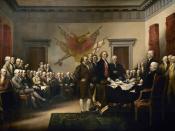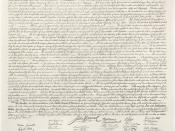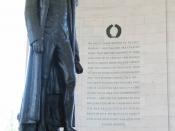In the two drafts of the United States Declaration of Independence and Elizabeth Cady Stanton's Declaration of Sentiments and Resolutions, they all were composed with a common thread and stance. All three had very strong language that produced the serious and not-willing to let down backbone of the essays.
Combined with strategically language, the Declaration of Independence itself is beautifully written. It appeals both to the heart but to the mind. When I think about it, when the colonies first began, religion was the predominant reason for living in the newfound land. And soon following, Christianity was growing at its' exceptional rate by drawing people in with its feeling and heart felt propaganda, luring people in with its personal appeal. So when I read the essay I had that same perception of the tactic they were using to go about but since it was written in such a technical manner the essay manages to pull me in with the personal allure through intellectual knowledge and vision.
In the first and original draft of the Declaration of Independence showed the main theme and scheme of ideas with ideas elaborated more broadly upon. In the beginning of it the second paragraph differs from the final draft because of the less technical and more ease of the writing style. I recognized the same over all themes but the writing style was not as confronting or technical as the same passage in the final draft.
Another influential alteration from the original to the final draft were the capitalization of key words. When speaking of the British crown the final draft capitalizes all references of him to He. Other key capitalizations in the final were words that when revised they found would strike more boldly when capitalized such as: Government, Laws of Nature, Nature's God, Safety, Happiness, Legislation, Taxes without Consent, Trial by Jury, War, Citizens, Cruelty, Commerce, Peace, Alliances, Separation, Declaration, Lives, Fortunes, and Honor. Those words are capitalized to bring focus on what they want and what they have a distinct issue with. Like taxes without consent is capitalized because they feel that is unjust and that is something they will ultimately have changed.
The layout is changed from the original to the final draft as well. They both begin with rights given to them as human beings and that those rights are undeniably theirs. Then they go on to claim that the British crown does not uphold those rights and then start to prove these claims by telling how he has not upheld them in the past. "The history of his present majesty, is a history unremitting injuries and usurpations, among which no one fact stands single or soliditary to contradict the uniform tenor of the rest, all of which have in direct objects the establishment of an absolute tyranny over these states."ÃÂ Next, the bullets of how come to follow. In the final draft a longer bullet from the original is turned into a more detailed and beneficial paragraph.
Also in the final draft, the section about religion, slavery, and crimes is taken out. I believe it was taken out because they wanted the focus of this declaration to be more about human rights and rights of the people then the issues and problems of the times. By later removing religion from state I feel it extraordinarily important that they did take that out of the declaration because it exhibits they do believe that there is a difference.
I think the choice of having the middle section listed in bullets was an emphasizing way to strengthen their argument. The lay out is forward and very clear at the same time. It lists exactly how they find the King to rule unjustly and it is clear for the eyes to read. They also extract and clean up the last section of the original draft by cutting key passages and making them into bullets of the middle section. "But Scotch & foreign mercenaries to invade & deluge us in blood."ÃÂ The last section denoting what is it they ultimately want is cleaned up as well. They do not make it as vague and lengthy. I think that change is beneficial because what they want to do is make the declaration more straight forward and to the point, and by cutting all that out it makes the argument clear and stronger. The format using the very end to state what exactly wanted is a nice strategy as well. They leave the very end to exclaim what is it they demand, and leaves the reader with that lasting bold impression.
After reading the drafts of the Declaration of Independence, it was rewarding to read the Declaration of Sentiments and Resolutions because in Elizabeth Cady Stanton's rendition the declaration had the twist. Writing about women's rights and what they demand for themselves, this essay uses the same theme and strategy and does a beautiful job of it. I think she really did do justice to the Declaration of Independence, she used focal lines, like "When, in the course of human events..." and "We hold these truths self-evident..." and "Whenever any form of government, laying its foundation on such principles, and organizing its powers in such form, as to them shall seem most likely to effect their safety and happiness." boldly states her stance that brings you into the essay knowing that you better be ready for a powerful argument.
Cady Stanton also uses the bullets from the Declaration of Independence but instead of He being the King of Britain, He in this case is Man. She uses the same techniques to prove that Man has unjustly done women wrong. She also uses the same layout technique as Thomas Jefferson. In the last paragraph, the last sentence states, "We hope this convention will be followed by a series of Conventions embracing every part of our nation."ÃÂ That closes the piece with a statement that embraces bringing together people, men and women.
I admire Elizabeth Cady Stanton for using such an immaculate piece of writing to be her outline. By choosing the Declaration of Independence she knows that the theme will be respected because it broke the United States from the crown. And it is intelligent of her to use it because it was man who wrote it for freedom and to no see just in her interpretation would be hypocritical.





